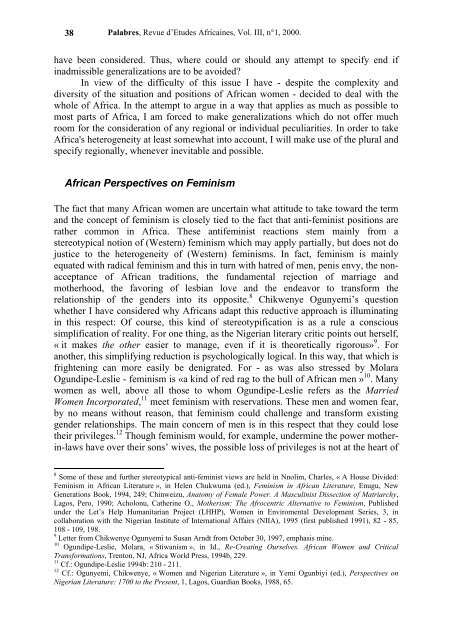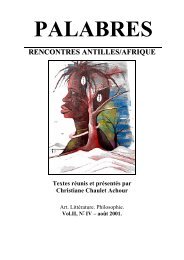Télécharger - Revue Palabres
Télécharger - Revue Palabres
Télécharger - Revue Palabres
You also want an ePaper? Increase the reach of your titles
YUMPU automatically turns print PDFs into web optimized ePapers that Google loves.
38<br />
<strong>Palabres</strong>, <strong>Revue</strong> d’Etudes Africaines, Vol. III, n°1, 2000.<br />
have been considered. Thus, where could or should any attempt to specify end if<br />
inadmissible generalizations are to be avoided?<br />
In view of the difficulty of this issue I have - despite the complexity and<br />
diversity of the situation and positions of African women - decided to deal with the<br />
whole of Africa. In the attempt to argue in a way that applies as much as possible to<br />
most parts of Africa, I am forced to make generalizations which do not offer much<br />
room for the consideration of any regional or individual peculiarities. In order to take<br />
Africa's heterogeneity at least somewhat into account, I will make use of the plural and<br />
specify regionally, whenever inevitable and possible.<br />
African Perspectives on Feminism<br />
The fact that many African women are uncertain what attitude to take toward the term<br />
and the concept of feminism is closely tied to the fact that anti-feminist positions are<br />
rather common in Africa. These antifeminist reactions stem mainly from a<br />
stereotypical notion of (Western) feminism which may apply partially, but does not do<br />
justice to the heterogeneity of (Western) feminisms. In fact, feminism is mainly<br />
equated with radical feminism and this in turn with hatred of men, penis envy, the nonacceptance<br />
of African traditions, the fundamental rejection of marriage and<br />
motherhood, the favoring of lesbian love and the endeavor to transform the<br />
relationship of the genders into its opposite. 8 Chikwenye Ogunyemi’s question<br />
whether I have considered why Africans adapt this reductive approach is illuminating<br />
in this respect: Of course, this kind of stereotypification is as a rule a conscious<br />
simplification of reality. For one thing, as the Nigerian literary critic points out herself,<br />
« it makes the other easier to manage, even if it is theoretically rigorous» 9 . For<br />
another, this simplifying reduction is psychologically logical. In this way, that which is<br />
frightening can more easily be denigrated. For - as was also stressed by Molara<br />
Ogundipe-Leslie - feminism is «a kind of red rag to the bull of African men » 10 . Many<br />
women as well, above all those to whom Ogundipe-Leslie refers as the Married<br />
Women Incorporated, 11 meet feminism with reservations. These men and women fear,<br />
by no means without reason, that feminism could challenge and transform existing<br />
gender relationships. The main concern of men is in this respect that they could lose<br />
their privileges. 12 Though feminism would, for example, undermine the power motherin-laws<br />
have over their sons’ wives, the possible loss of privileges is not at the heart of<br />
8 Some of these and further stereotypical anti-feminist views are held in Nnolim, Charles, « A House Divided:<br />
Feminism in African Literature », in Helen Chukwuma (ed.), Feminism in African Literature, Enugu, New<br />
Generations Book, 1994, 249; Chinweizu, Anatomy of Female Power. A Masculinist Dissection of Matriarchy,<br />
Lagos, Pero, 1990; Acholonu, Catherine O., Motherism: The Afrocentric Alternative to Feminism, Published<br />
under the Let’s Help Humanitarian Project (LHHP), Women in Enviromental Development Series, 3, in<br />
collaboration with the Nigerian Institute of International Affairs (NIIA), 1995 (first published 1991), 82 - 85,<br />
108 - 109, 198.<br />
9 Letter from Chikwenye Ogunyemi to Susan Arndt from October 30, 1997, emphasis mine.<br />
10 Ogundipe-Leslie, Molara, « Stiwanism », in Id., Re-Creating Ourselves. African Women and Critical<br />
Transformations, Trenton, NJ, Africa World Press, 1994b, 229.<br />
11 Cf.: Ogundipe-Leslie 1994b: 210 - 211.<br />
12 Cf.: Ogunyemi, Chikwenye, « Women and Nigerian Literature », in Yemi Ogunbiyi (ed.), Perspectives on<br />
Nigerian Literature: 1700 to the Present, 1, Lagos, Guardian Books, 1988, 65.



